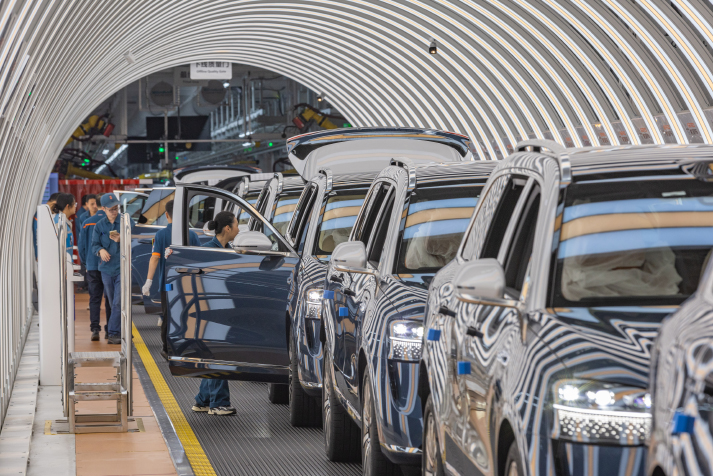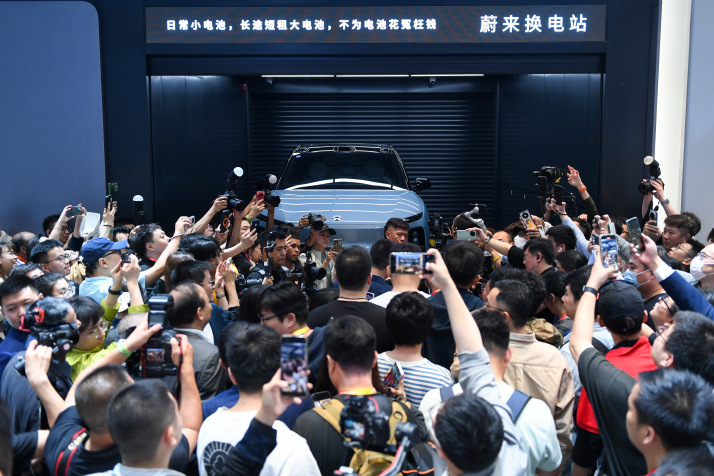| Business |
| The claim of China's "overcapacity" is distorting the truth of the new-energy industry | |
|
|
 Workers check the quality of new-energy vehicles at a smart factory of Chinese vehicle manufacturer Seres Group in Liangjiang New Area, southwest China’s Chongqing Municipality, on April 25 (XINHUA)
Senior U.S. and European Union officials recently visiting China repeated concerns about the country's "overcapacity" during discussions with their Chinese counterparts. Prior to her latest trip to China in early April, the second in nine months, U.S. Treasury Secretary Janet Yellen said China's "overcapacity" in new industries like solar energy, electric vehicles (EVs) and lithium-ion batteries "distorts global prices" and "hurts American firms and workers, as well as firms and workers around the world." Some Western economists believe overcapacity can lead to oversupply. And an oversupply in this scenario could mean that Chinese companies must accelerate their sales, including by boosting exports. The fear is that doing so might increase tensions with key trading partners as well as limit space for overseas brands to expand their markets. Ma Wei, a research fellow at the Institute of American Studies under the Chinese Academy of Social Sciences, dismissed the U.S. accusations against China as ill-founded. He told Beijing Review that "the U.S.' concerns stem from China's technological innovation, comprehensive industrial chain, robust competition and increasing global popularity in the new industries. As China's products gain traction in Europe and the U.S., they are affecting the auto industry there, which is slow to adapt to the transition to EVs." Chinese Foreign Ministry spokesperson Lin Jian said at a press briefing on April 19 that Washington's claims about China's "overcapacity" are designed to "secure a more advantageous competitive position and market advantage for itself, representing blatant economic coercion and bullying." Exaggerated? China's production capacity has drawn global attention due to the surge in the country's exports of three key products—EVs, lithium-ion batteries and solar panels—all of which are integral to the low-carbon economy. According to statistics released by the General Administration of Customs of China on January 19, the combined export value of these "new three" products surpassed 1.06 trillion yuan ($150 billion) in 2023. This was the first time their export value had exceeded the 1-trillion-yuan threshold, representing an extraordinary growth of 29.9 percent and underscoring China's growing competitiveness in these sectors. An April 2 article published on BNN Bloomberg, Bloomberg's business news network in Canada, read: "Overcapacity might result in vast parking lots filled with unsold cars. But Chinese automakers' inventories don't look high, according to a Bloomberg analysis of listed companies." The most common way to measure overcapacity is capacity utilization, which is rated on a scale from zero to 100, where zero means factories are laying idle and 100 means maximum utilization. China's biggest EV exporters, including BYD, Tesla's Shanghai factory and SAIC Motor Corp., all have capacity utilization rates above 80 percent, according to estimates from JSC Automotive, a consultancy specializing in China's automotive market. The U.S. and developed European economies consider any rate between 79 percent and 83 percent to be normal. "Some analysts, who estimate China has a carmaking capacity of 50 million or more and conclude that utilization is below 50 percent relative to domestic sales of 22 million, include obsolete capacity in their calculations or are simply bluffing," Paul Gong, head of China automotive research at UBS Group AG, a multinational investment bank and financial services company based in Switzerland, told BNN Bloomberg. "The overcapacity narrative has been exaggerated and oversimplified." One oversimplification is ignoring the distinction between EVs and gas-powered cars, sales of which have plummeted amid the transition to electric and hybrid vehicles, he added. Returning to the actual concept of overcapacity, Ma explained that it is an economic term that refers to a situation where production exceeds demand. Despite the "overcapacity" allegations, China's supply capacity in new-energy vehicles (NEVs) still cannot meet global demand. The term NEV is used to designate automobiles that are fully or predominantly powered by electric energy, which include plug-in vehicles, battery electric vehicles, plug-in hybrid electric vehicles and fuel cell electric vehicles. According to research firm EVTank, global sales of NEVs reached 14.65 million units in 2023, with China producing 9.6 million NEVs. The notion of overcapacity should not be oversimplified or attributed solely to one country, Premier Li Qiang said during his talks with German Chancellor Olaf Scholz in Beijing on April 16. From the market perspective, production capacity is determined by the relationship between supply and demand. Having a capacity that slightly exceeds demand is conducive to full market competition and promoting the survival of the fittest, Li said. Taking a global view, each nation focuses on developing industries where it holds a comparative advantage, while relying on imports from other countries for sectors where it lacks capacity. By recognizing and leveraging their respective strengths, countries can collaborate for shared development, Li added. Ferdinand Dudenhöffer, Director of the Center Automotive Research, a research company focusing on mobility, told Xinhua News Agency earlier this year that the Chinese EV market is far from saturated. It will continue to maintain a faster and stronger growth momentum compared to the European and American markets.  Visitors watch the demonstration of a battery swap station produced by Chinese automobile manufacturer NIO at the Beijing International Automotive Exhibition 2024 on April 25(XINHUA)
Pretext of protectionism Accusing China's new energy industry of overcapacity is a sign of protectionism, Chinese Foreign Ministry spokesperson Wang Wenbin said at a regular press briefing on April 24. "In our view, the 'overcapacity' rhetoric is just an excuse for protectionism. To limit the export of China's new energy products, such as EVs, will see everybody lose. The world doesn't want less of China's capacity, but more funding and products to speed up energy transition and reduce poverty," he added. China is by far the world's largest market for pure electric and hybrid vehicles, with domestic sales surging 36 percent last year and expected to grow by 25 percent this year. But its export to production ratio, a measure that calculates the percentage of a country's total production that is exported to other countries, is far lower than that of other major car producing nations such as Germany, Japan and the Republic of Korea. Germany, for example, in 2023 exported over 2.8 million vehicles out of all the 3.6 million units it manufactured. The intense competition in the Chinese market is a key factor behind the success of Chinese NEV brands, according to Tang Jin, a senior research officer at Japan's Mizuho Bank. He emphasized that the principle of "survival of the fittest" governs the market, leading to the emergence of winners. Tang further pointed out that a closer examination of the Chinese EV market would debunk Western criticisms alleging that China's automotive industry relies on government subsidies to dominate the global market. Christopher Mutsvangwa, Secretary for Information and Publicity for Zimbabwe African National Union-Patriotic Front, noted China's advantage lies in its complete value chain, efficient manufacturing system, and intellectual property rights. He argued that this advantage allows developing countries to purchase the best value-for-money new energy batteries, swiftly transitioning from fossil fuels to green energy and aiding global efforts to combat climate change. He criticized the hype around overcapacity stirred up by some developed economies as a means to protect their own industries, which is detrimental to global trade. "When the U.S. has a competitive advantage, it often champions the cause of free markets. However, when it lacks such an advantage, it resorts to protectionism and even attempts to discredit other countries. This approach is bound to face opposition from the international community," Ma elaborated. (Print Edition Title: An Oversimplified Narrative?) Copyedited by Elsbeth van Paridon Comments to liwenhan@cicgamericas.com |
|
||||||||||||||||||||||||||||||
|